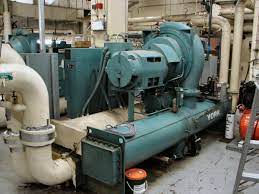As the summer temperatures soar, keeping cool becomes paramount. However, selecting the appropriate cooling system for buildings can pose a multifaceted challenge. Two prevalent choices are air conditioners (ACs) and chillers.
Despite both serving the ultimate purpose of cooling, they operate through distinct mechanisms. Let's dissect the primary variances to aid in determining which option aligns best with your requirements.
Air Conditioners: Providing Comfort in Cozy Areas
Most of us are familiar with air conditioners. They are self-contained units that cool air directly. Here's a simplified breakdown of their process:
- A refrigerant absorbs heat from the indoor air.
- The hot refrigerant travels outside to a condenser coil.
- A fan blows air over the condenser coil, releasing the heat.
- The cooled refrigerant returns inside to repeat the cycle.
AC units are perfect for:
- Homes
- Apartments
- Small offices
Pros:
- Easy installation and maintenance
- Relatively inexpensive upfront cost
- Zonal cooling (cooling specific areas)
Cons:
- Less efficient for large spaces
- May struggle to maintain consistent temperatures in uneven climates
Chillers: Efficient Cooling Solutions for Spacious Environment
Chillers take a different approach. They act like central cooling plants, generating chilled water that is then distributed throughout a building to cool the air. Here's a basic overview:
- A chiller uses a refrigerant to cool down a water loop.
- Chilled water is pumped to air handling units or fan coil units throughout the building.
- Air handlers or fan coils blow air over the chilled water coils, cooling the air.
- The warmed water returns to the chiller to be cooled again.
Chillers are ideal for:
- Large buildings (offices, hotels, hospitals)
- Data centers
- Industrial facilities
Pros:
- Highly efficient for large-scale cooling
- More precise temperature control
- Can be used for both cooling and heating (with additional equipment)
Cons:
- Higher initial installation and maintenance costs
- Complex system requiring skilled technicians
- Choosing the Right System
So, which one should you choose? Here are some factors to consider:
Size of the space: For smaller areas, an AC is likely sufficient. Chillers are better suited for large buildings.
Budget: AC units typically have a lower initial cost, whereas chillers entail higher upfront expenses but can yield greater long-term savings. Chillers excel in providing precise temperature regulation and are well-suited for maintaining consistent cooling in expansive areas.
Both air conditioners and chillers are crucial for maintaining comfortable temperatures. Familiarizing yourself with their advantages and limitations will empower you to choose the most suitable option for your requirements.
When uncertain about which system to select, seeking guidance from an HVAC expert is advisable.
Consulting an HVAC professional can also help you:
- Understand the specific cooling requirements of your building.
- Consider factors such as initial cost, energy efficiency, and maintenance needs.
- Ensure the chosen system complies with local building codes and regulations.
- Design a long-term maintenance plan to optimize system performance and lifespan.
By considering these additional factors, you can make an informed decision that ensures your cooling system meets your needs for both comfort and cost-effectiveness.


No comments yet